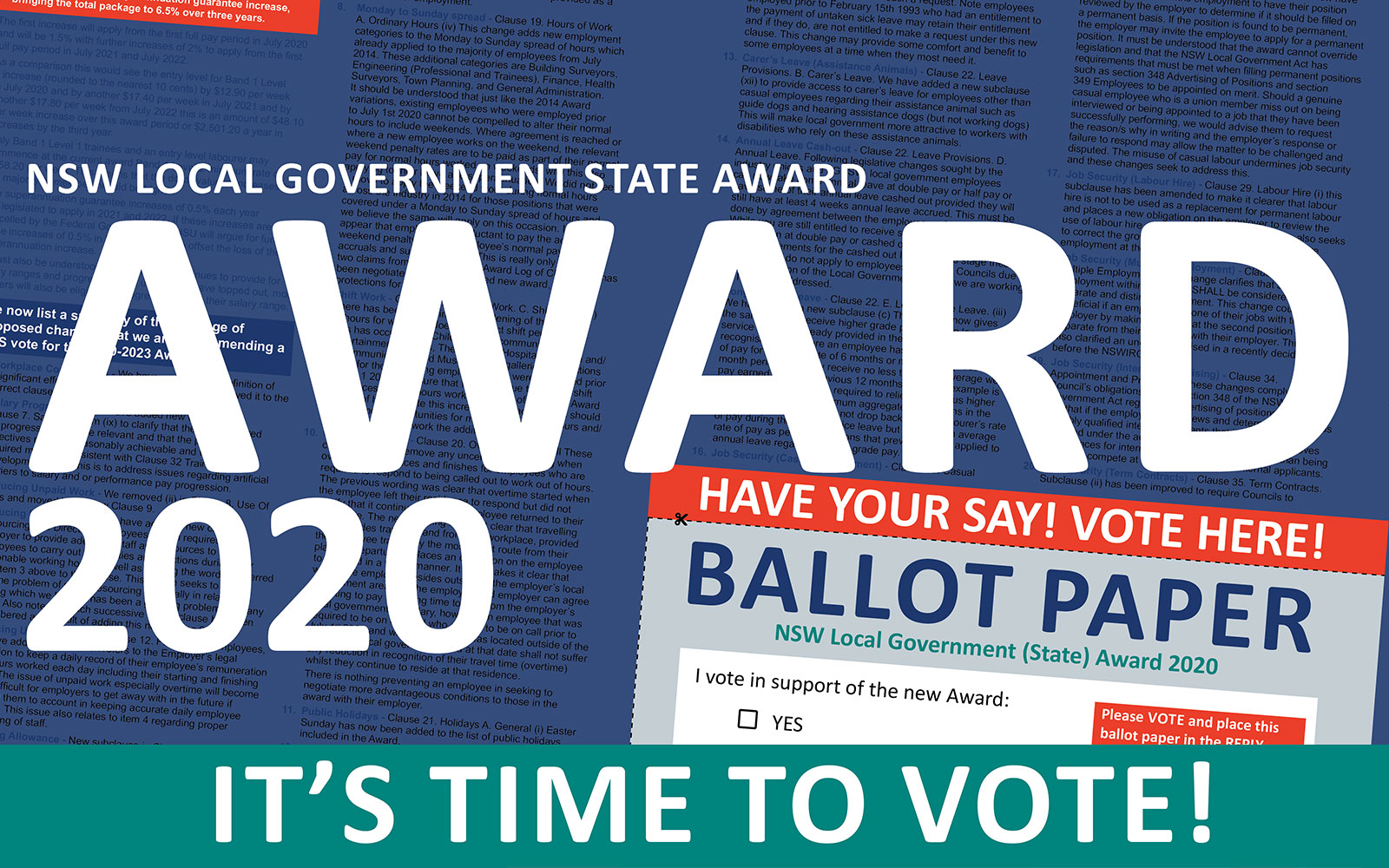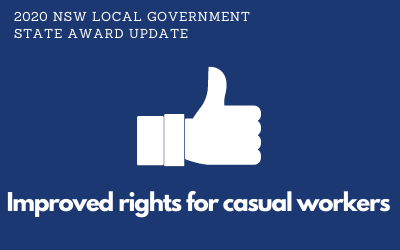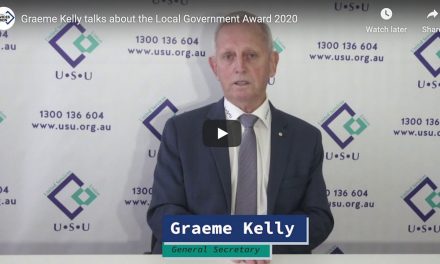

USU General Secretary Graeme Kelly: “I urge you to vote YES to your new Award.”
As USU members know, the USU has been participating in ongoing NSW Local Government Award negotiations since August 2019 for the upcoming 2020 to 2023 NSW Local Government State Award due to commence, if voted in, from 1 July 2020.
These award negotiations have been more difficult than usual because the USU was presented with a somewhat hostile Log of Claims from the Employer’s Association. The employer’s claims sought to attack and reduce existing award rights and conditions. Negotiations have also been more difficult because of the disruptions we have encountered due to the Covid-19 virus.
The current restrictions placed on gatherings will not allow the USU to hold our traditional 347 mass meetings of members at every Council across NSW who are covered by the 2020-2023 Award.

USU General Secretary Graeme Kelly: “I urge you to vote YES to your new Award.”
As USU members know, the USU has been participating in ongoing NSW Local Government Award negotiations since August 2019 for the upcoming 2020 to 2023 NSW Local Government State Award due to commence, if voted in, from 1 July 2020.
These award negotiations have been more difficult than usual because the USU was presented with a somewhat hostile Log of Claims from the Employer’s Association. The employer’s claims sought to attack and reduce existing award rights and conditions. Negotiations have also been more difficult because of the disruptions we have encountered due to the Covid-19 virus.
The current restrictions placed on gatherings will not allow the USU to hold our traditional 347 mass meetings of members at every Council across NSW who are covered by the 2020-2023 Award.
Have your say via our Postal Ballot
As a result our options are limited and it was deemed appropriate to conduct a direct postal ballot of members on the proposed Award. This is not our preferred option, we would prefer to hold face to face mass meetings of USU members, however the pandemic has left us with no other choice. (see below about how to make sure your vote counts)
The USU is happy to announce that we have again held off the overwhelming majority of the employer’s claims which sought to reduce or remove many hard fought rights and conditions.
We have also been successful in our campaign to secure significant state funding to assist NSW Councils during the pandemic. Many Councils will still face significant financial challenges due to lost revenue as ratepayers and local businesses struggle in these difficult economic times.
While some Councils will come through this crisis better than others, these Councils will be in the minority, therefore the Award we negotiate has to be affordable for the overwhelming majority of Councils.
Australia is in recession
Due to the economic uncertainty with the Australian and global economy, where Australia is now officially in its first recession in more than 30 years which may also see the economy fall into a depression, we had to consider whether we should negotiate a one year award and hope for an economic recovery in 2021 and 2022. This would have allowed us to have a better understanding of the full impact of the pandemic on our economy, and may have allowed us to negotiate additional wage increases if things improved. However there are risks with this approach, as the economic outlook may worsen, resulting in wage freezes or minimal wage increases.
We do not want our members to experience a wage freeze. Those who were employed in NSW Councils in the late 1980’s and the early 1990’s would recall the 4 year period with no Award increases and only an $8.00 per week safety net increase in 1 of those 4 years. Regular annual wage increases in the NSW Local Government Award only commenced in 1995, and the USU wants this to continue.
Award certainty in an uncertain future
Following extensive negotiations it was determined that it would be best to provide some certainty of Award pay increases over the next 3 years rather than take the risk and have our members face uncertainty regarding future Award pay increases.
Without the pandemic the projected Award increases for each of the next 3 years would likely have come in at around 2.5% per year or 7.5% over 3 years. This increase would also need to take into account the Federal Government legislated superannuation guarantee increases of 0.5% in 2021 and 0.5% in 2022, meaning real wage increases would have been around 6.5% over 3 years with a further 1% increase in superannuation.
Adding to this uncertainty is the possibility that the State and Federal Governments may at any time decide to legislate a freeze on public sector wages or at the very least reduce any increases below what was expected prior to the pandemic.
In this Award, the USU has been able to secure an Award package focussing on improvements to job security with a wage increase of 5.5% over three years. Additionally there will be a further 1% superannuation guarantee increase, bringing the total package to 6.5% over three years.
Wage increases
The first increase will apply from the first full pay period in July 2020 and will be 1.5% with further increases of 2% to apply from the first full pay period in July 2021 and July 2022.
As a comparison this would see the entry level for Band 1 Level 2 increase (rounded to the nearest 10 cents) by $12.90 per week in July 2020 and by another $17.40 per week in July 2021 and by another $17.80 per week from July 2022 this is an amount of $48.10 per week increase over this award period or $2,501.20 a year in increases by the third year.
Only Band 1 Level 1 trainees and an entry level labourer may commence at the current award Band 1 Level 2 minimum rate of $858.20 per week. This means that the dollar value of increases for the majority of members would be higher.
The superannuation guarantee increases of 0.5% each year are legislated to apply in 2021 and 2022. If these increases are cancelled by the Federal Government the USU will argue for further wage increases of 0.5% in 2021 and 2022 to offset the loss of the superannuation increase.
It must also be understood that the Award continues to provide for salary ranges and progression and unless you have topped out, most workers will also be eligible for progression within their salary range.
Why you should support this package:
When considering whether to support this Award package as recommended by your Union, we would ask you to remember the series of award updates that the USU circulated every week or two in late 2019 and early 2020 after we received the Employer’s Log of Claims. (these updates can all be viewed here: www.usu.org.au/award2020)
Make no mistake, this package has only come about by our preparedness to oppose the most hostile elements of the Employer’s Log of Claims. At the same time, we have promoted and argued in support of our Log of Claims which addresses past weaknesses in award wording and improves conditions. We have also achieved annual pay increases in an economic climate where Australia is experiencing the highest level of unemployment most of us have seen in our working lives.
Members are advised that USU employees are subject to the same increases in pay as those contained in the Local Government State Award.
A yes vote to support the award will see a new improved award with ongoing pay increases for the next 3 years commencing on July 1st 2020 and will provide you with more certainty regarding your award rights and wage increases than the overwhelming majority of Australian workers.
Just speak to your friends and family and ask about their conditions and pay increases and you will soon confirm what we are saying.
A no vote on the award will delay the award from commencing and any benefit and certainty it provides and may not result in a better outcome.
If we are required to arbitrate the award it will be delayed significantly.
All members are urged to support the Award package as presented and Vote Yes.
HOW TO VOTE YES FOR YOUR NEW AWARD:
1. Tick ✓ YES on the Ballot paper you receive in the mail. Ballot papers will be posted w/b 8 June to the address we have on our records
2. Post it back to the union using the REPLY PAID ENVELOPE supplied.
3. No stamp required!
Post your Ballot Paper as soon as you receive it. Ballots must be RECEIVED by the Union by MIDDAY FRIDAY 26 JUNE 2020 otherwise they will not be counted.
The Ballot count will be supervised by a Returning Officer from Unions NSW.
A summary of the package of proposed changes that we are recommending a YES vote for the 2020-2023 Award.
- Workplace Consultation – We have removed the definition of “Significant effects” in clause 4 Definitions (xi) and moved it to the correct clause of the Award now clause 40.
- Salary Progression – We have added new wording in Clause 7. Salary System (ix) to clarify that the skills required for progression must be relevant and that the performance objectives must be reasonably achievable and that training required must be consistent with Clause 32 Training and Development. Note this is to address issues regarding artificial barriers to salary and or performance pay progression.
- Reducing Unpaid Work – We removed (ii) in Clause 8. Use Of Skills and moved it to a new Clause 9.
- Reducing Unpaid Work – We have added a new clause 9. Resourcing and Directing Employees, which requires the employer to provide adequate staff and resources to enable employees to carry out their duties and functions during their reasonable working hours as well as moving the wording referred to in item 3 above to this clause. This clause seeks to deal with the problem of under resourcing especially in relation to staffing which we believe has been a growing problem for many years. Also note that each successive award clause has been renumbered as a result of adding this new clause 9.
- Reducing Unpaid Work – In Clause 12. Payment of Employees, we have added a note which refers to the Employer’s legal obligation to keep a daily record of their employee’s remuneration and hours worked each day including their starting and finishing times. The issue of unpaid work especially overtime will become more difficult for employers to get away with in the future if we hold them to account in keeping accurate daily employee records. This issue also relates to item 4 regarding proper resourcing of staff.
- Camping Allowance – New subclause in Clause 16. Allowances Additional Payments and Expenses (xi) Camping Out (J) Where the employee is required to work more than 5 hours onsite on the final day of camping out and the employer has not provided a meal, that employee will be entitled to a meal allowance.
- Leaseback Vehicles – New wording in Clause 17. Motor Vehicle Arrangements. B. Leaseback Vehicles (i) General. The new wording places a responsibility on the Employer to prove that a leaseback vehicle was not provided as a condition of employment.
- Monday to Sunday spread – Clause 19. Hours of Work A. Ordinary Hours (iv) This change adds new employment categories to the Monday to Sunday spread of hours which already applied to the majority of employees from July 2014. These additional categories are Building Surveyors, Engineering (Professional and Trainees), Finance, Health Surveyors, Town Planning, and General Administration. It should be understood that just like the 2014 Award variations, existing employees who were employed prior to July 1st 2020 cannot be compelled to alter their normal hours to include weekends. Where agreement is reached or where a new employee works on the weekend, the relevant weekend penalty rates are to be paid as part of their normal pay for normal hours worked on weekends, with this also applying to their leave and superannuation. We did not see a move to apply the weekend work during normal hours across the industry in 2014 for those positions that were covered under a Monday to Sunday spread of hours and we believe the same will apply on this occasion. It would appear that employers are reluctant to pay the additional weekend penalty rates to employee’s normal pay, leave accruals and superannuation. This is really only one of the two claims from the Employer’s Award Log of Claims that has been negotiated into this proposed new award, albeit with protections for existing staff.
- Shift Work – Clause 19. Hours of Work. C. Shift Work. (ii) There has been some limited broadening of the spread of hours for work that does not attract shift penalty . This has occurred for Childcare and community care, Entertainment, Events, Theatres and Hospitality, Media and/or communication, and Museums and galleries. Protections apply for those existing employees who were employed prior to July 1 2020 to ensure that they continue to receive shift allowances for any hours worked outside of the 2017 Award spread of hours. Note this increased spread of hours should provide more opportunities for more paid working hours and/or for more staff to work the additional hours.
- On Call Overtime – Clause 20. Overtime C. On Call These changes seek to remove any uncertainty regarding when overtime commences and finishes for employees who are required to respond to being called out to work out of hours. The previous wording was clear that overtime started when the employee left their residence to respond but did not clarify that it continued until the employee returned to their residence. The new wording makes it clear that travelling time includes travel “to and from” the workplace, provided the employee travels by the most direct route from their place of departure. It places an obligation on the employee to respond in a timely manner. It also makes it clear that where the employee resides outside of the employer’s local government area that the employee and employer can agree in writing to pay travelling time to and from the employer’s local government boundary, however an employee that was required to be on call and who agreed to be on call prior to July 1st 2020 and whose residence was located outside of the employer’s local government area at that date shall not suffer any reduction in recognition of their travel time (overtime) whilst they continue to reside at that residence.
There is nothing preventing an employee in seeking to negotiate more advantageous conditions to those in the award with their employer. - Public Holidays – Clause 21. Holidays A. General (i) Easter Sunday has now been added to the list of public holidays included in the Award.
- Sick Leave – Clause 22. Leave Provisions A. Sick Leave. A new subclause (xii) has been added which will provide access to up to 48 weeks of paid sick leave for employees who have a diagnosed terminal illness which is incurable and which is expected to lead to their death. They can make a request to take their accrued sick leave under this clause if they are unable to work due to a terminal illness until their sick leave is exhausted (up to a maximum of 48 weeks) or they die. The employer shall not unreasonably refuse such a request. Note employees employed prior to February 15th 1993 who had an entitlement to the payment of untaken sick leave may retain their entitlement and if they do, are not entitled to make a request under this new clause. This change may provide some comfort and benefit to some employees at a time when they most need it.
- Carer’s Leave (Assistance Animals) – Clause 22. Leave Provisions. B. Carer’s Leave. We have added a new subclause (xii) to provide access to carer’s leave for employees other than casual employees regarding their assistance animal such as guide dogs and hearing assistance dogs (but not working dogs) This will make local government more attractive to workers with disabilities who rely on these assistance animals.
- Annual Leave Cash-out – Clause 22. Leave Provisions. D. Annual Leave. Following legislative changes sought by the industry unions and LGNSW, local government employees can now take some annual leave at double pay or half pay or have some of their annual leave cashed out provided they will still have at least 4 weeks annual leave accrued. This must be done by agreement between the employee and the employer. While you are still entitled to receive superannuation on annual leave taken at double pay or cashed out, you do not accrue leave entitlements for the cashed out leave. At this stage these entitlements do not apply to employees of County Councils due to the operation of the Local Government Act, but we are working to have this addressed.
- Long Service Leave – Clause 22. E. Long Service Leave. (iii) We have added a new subclause (c) This change now gives the same right to receive higher grade pay whilst on long service leave as already provided in the annual leave clause by recognising that where an employee has received a varying rate of pay for an aggregate of 6 months or more in the preceding 12 month period, that they receive no less than their average weekly pay earned over the previous 12 months. A simple example is a labourer who has been required to relieve in various higher paid positions for the minimum aggregate of 6 months in the preceding 12 months does not drop back to their labourer’s rate of pay during their long service leave but receives an average rate of pay as per the conditions that previously only applied to annual leave regarding higher grade pay.
- Job Security (Casual Employment) – Clause 27. Casual Employment. The important changes to this clause will make it clearer than ever that casuals are not to be used to replace employees on a permanent basis or be engaged on a permanent basis. A genuine casual employee shall now have the right after 12 months employment to have their position reviewed by the employer to determine if it should be filled on a permanent basis. If the position is found to be permanent, the employer may invite the employee to apply for a permanent position. It must be understood that the award cannot override legislation and that the NSW Local Government Act has requirements that must be met when filling permanent positions such as section 348 Advertising of Positions and section 349 Employees to be appointed on merit. Should a genuine casual employee who is a union member miss out on being interviewed or being appointed to a job that they have been successfully performing, we would advise them to request the reason/s why in writing and the employer’s response or failure to respond may allow the matter to be challenged and disputed. The misuse of casual labour undermines job security and these changes seek to address this.
- Job Security (Labour Hire) – Clause 29. Labour Hire (i) this subclause has been amended to make it clearer that labour hire is not to be used as a replacement for permanent labour and places a new obligation on the employer to review the use of labour hire on an annual basis. This change also seeks to correct the growing problem of the misuse of insecure employment at the expense of permanent employment.
- Job Security (Multiple Employment) – Clause 30. Multiple Employment. This change clarifies that secondary employment within a Council SHALL be considered as separate and distinct employment. This change could be beneficial if an employee lost one of their jobs with their employer by making it clear that the second position is separate from their other role with their employer. This change also clarified an uncertainty raised in a recently decided case before the NSWIRC.
- Job Security (Internal Advertising) – Clause 34. Appointment and Promotion. These changes comply with Council’s obligations under Section 348 of the NSW Local Government Act regarding advertising of positions and points out that if the employer first reviews and determines that it has suitably qualified internal applicants that it may then not be required under the act to advertise externally. This improves the chances for internal staff to be promoted rather than being forced to compete at every occasion with external applicants.
- Job Security (Term Contracts) – Clause 35. Term Contracts. Subclause (ii) has been improved to require Councils to identify the reason for a position being offered as a term contract. This will allow us a greater opportunity to challenge inappropriate term contract positions prior to them being filled.
- Workplace Bullying – Clause 36. Grievance and Dispute Procedures. We have added a reference into the grievance and dispute clause to concerns regarding workplace bullying. While concerns regarding workplace bullying could always be addressed through the grievance and dispute clause, this change clarifies that position, and makes clear that the Award parties are opposed to workplace bullying. There are also some minor changes to the status quo provisions, clarifying that during a dispute the status quo may be temporarily adjusted to address a risk to workplace health and safety. Changes to this clause should be read in conjunction with the new workplace bullying clause dealt with below.
- Workplace Investigations – Clause 37. Disciplinary Procedures. Changes have been made to (v) to require the employer to consider whether a complaint has been made for frivolous or vexatious reasons prior to conducting an investigation. It is hoped that this will limit the number of unnecessary workplace investigations conducted against USU members. It should be noted that both the protected disclosures act and the model code of conduct also include this provision.
- Workplace Bullying – Clause 39. Workplace Bullying. A new clause regarding workplace bullying has been added in addition to the changes made to the grievance and dispute clause described above. This clause confirms that the award parties are committed to eliminating bullying in the workplace and pursuing legislative change to give the NSWIRC the power to address workplace bullying. The clause then defines bullying behaviour in a manner consistent with the Local Government Model Code of Conduct.
- Workplace Consultation – Clause 40. Workplace Change. The workplace change clause has been redrafted and reworded to make it easier to understand, and to establish additional obligations around consultation. The clause can be broken down into three parts, the pre-proposal stage, the proposal stage, and the implementation stage. During the pre-proposal stage the employer may consult with employees and unions in developing workplace change. During the proposal stage the employer must give affected employees and their unions written notice of the change at least 28 days before a decision is made. During the implementation stage the employer must give affected employees and their unions written notice of the decision being made at least 7 days before it is implemented. There are some limited exceptions to the workplace change clause which include employees consent, union consent and exceptional circumstances (in which case 14 days consultation must occur).
- Leave Reserved – Clause 44. Leave Reserved. This clause provides the award parties with the guaranteed right to seek to continue negotiations to vary the award on the agreed specific clauses named in this clause during its period of operation between July 1st 2020 until June 30th 2023 on matters which have been unable to be completely resolved before its commencement date due to their complexity or due to expected legislative changes which must first occur before the specific clause can be added or varied. Leave is reserved for expected legislative changes regarding the registration of professional engineers. The USU also had numerous issues it wished to include in this award regarding the application of the Adverse Working Conditions Allowances in both level 1 and level 2 as well as better defining sewer chokes, septic tanks and sewage treatment works for the purpose of entering maintaining and cleaning work. Covid 19 has prevented the award parties during these negotiations to conduct any site visits that may be required by the IRC in determining an outcome. It is expected that these site visits should be permissible in 2021 or soon after rather than waiting until the 2023 Award to make any improvements.
- The pay increases are covered at the beginning of this post.




